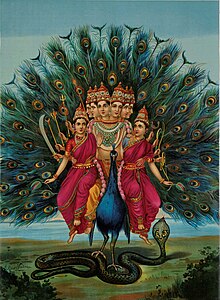The Yezidi - India connection edit

The following sources attribute an Indian connection to the Yezidi faith
1. YezidiTruth.org - A Humanitarian Organization in their website[1] carrys an essay that mentions the Indian origin of the Yezidi faith and the correspondence between the Hindu Murugan and Tawûsê Melek. Similarity between the icons such as Murugan’s other sacred symbols the snake and the peacock is deliberated on in detail.
2. A contemperory journalist visiting the Yezidi lands writes
- Although it is rooted in nature, Yezidism has similarities to Judaism, Christianity, Islam and Hinduism. [2]
3. www.yezidism.com on the origin of Yezidis writes
- (The Yezidi's are) Originally from India and therefore related to the Hindus[3]
4. On the origin of Yezidis, Aziz Tamoyan the President of the National Union of Yezidi in Armenia writes,
- The Yezidi emigrated from India to Afghanistan, and from Afghanistan into Iran and, lived in Iraq, and in Syria. In Iraq we started to call ourselves "Yezidi".[4]
5. An article written for the World Congress of Kurdish Studies, and carried by their website states
- persistence in Kurdish (Yezidi) culture a mythology of Indo-Iranian origin, which may have been transmitted to Roman Mithraism via Kurdistan[5]
6. Information about the Yezidis, an essay, writen by a Yezidi, and posted on website middleeastyouth.com begins with the following paragraph on the Yezidis,
- The Yezidis (”yuh-ZEE-deez”) are a Kurdish sect living in the Nineveh province of modern-day Iraq. Their religion is pre-Islamic and pre-Christian, yet it has absorbed certain qualities of both faiths. It has also absorbed elements of Zoroastrianism and Sufi mysticism. It is a matter of debate among scholars as to just how old the Yezidi religion actually is, but it is possible (though not proven) that the people and their faith are descended from ancient India. In any case, it may be that Yezidism is the original pagan religion of the Kurds.[6]
7. One simple practice which is similar is that the Yezidi like the Hindus and Parsis of India hang a string of leaves across the doors of their houses at the beginning of the new year.[7]
References edit
- ^ The Peacock Angle in Hinduism http://www.yeziditruth.org/the_peacock_angel%7C This site is hosted by International Order of Gnostic Templars - United States
- ^ SUSAN TAYLOR MARTIN, Times Senior Correspondent, http://www.sptimes.com/2004/04/26/Worldandnation/In_Iraq__ancient_sect.shtml
- ^ http://www.yezidism.com/
- ^ http://www.oneworld.am/journalism/yezidi/tamoyan.html
- ^ The Traditions of the Yezidis and Ahl-e Haqq as Evidence for Kurdish Cultural History Par Philip G. KREYENBROEK http://www.institutkurde.org/en/conferences/kurdish_studies_irbil_2006/Philip+KREYENBROEK.html
- ^ http://mideastyouth.com/2007/11/17/information-about-the-yezidi-kurds/
- ^ An inquiry into the religious tenets of the Yeezeedees by the Rev. George Percy Badger http://www.scribd.com/doc/6540426/Religious-Tenants-of-the-Yezidi